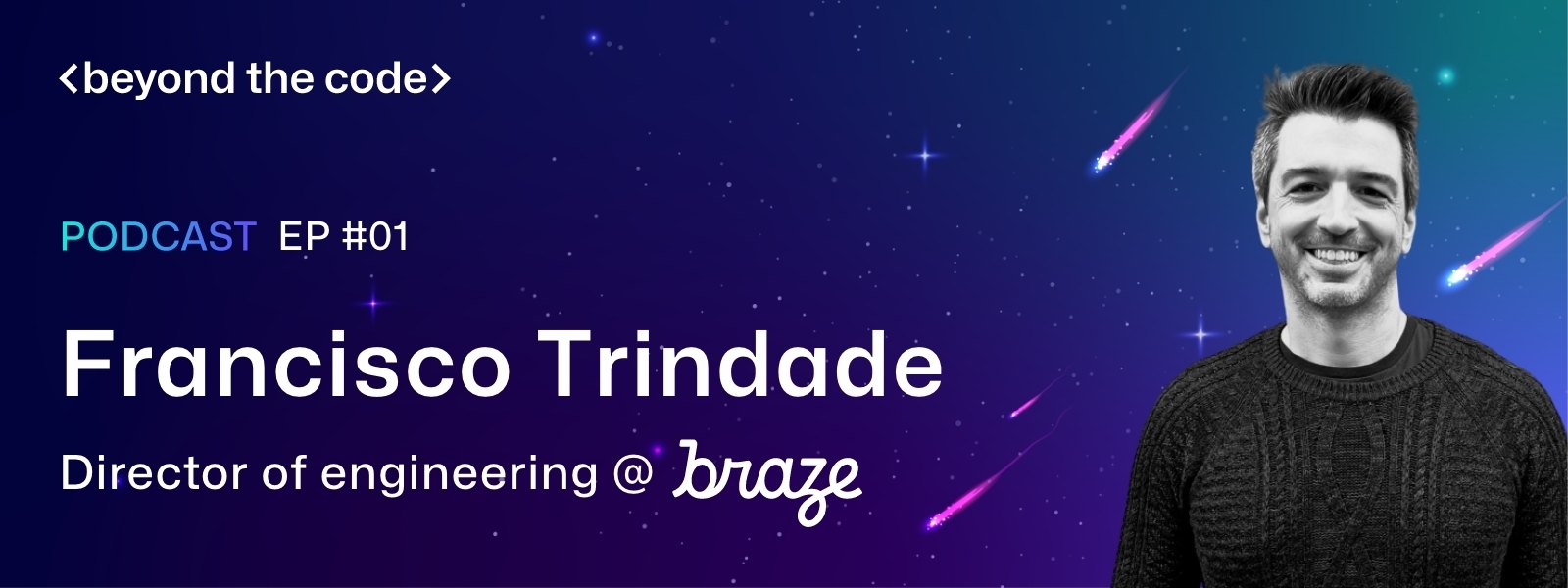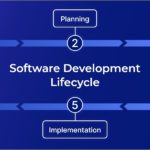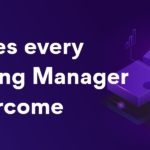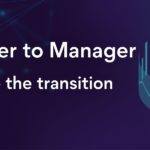On our very first episode of ‘Beyond the Code’, Host ‘Kshitij Mohan’, founder of Typo welcomes Francisco Trindade, Director of Engineering at Braze to discuss ways how to lead engineering teams efficiently.
Francisco provides valuable insights into the obstacles faced by engineering teams. He emphasizes that technical challenges are not always the main hurdles; instead, it’s often the lack of clear communication and well-defined goals. He also addresses the challenges encountered by engineering managers, highlighting the importance of behavioral aspects in leading teams effectively.
Moreover, Francisco unveils his secret sauce for maintaining team efficiency, further enriching his insights on successful team management.
Episode transcript:
Kshitij Mohan: Hello everyone, I’m Mohan, your host, back with a new episode of Beyond the Code by Typo. Today, we have a very special guest with us, Francisco. Francisco has been an amazing engineering leader for the past 15+ years. He has donned multiple hats across his entire journey. He has been a founder, a manager, and a consultant, right from startups to enterprises.
He had seen it all. Currently, he’s an engineering director with Brace in New York. Welcome Francisco to the show.
Francisco Trindade: Thank you, Mohan. Really happy to be here. And thanks for the lovely intro.
Kshitij Mohan: I think that definitely speaks of the work that you have done, Francisco. So thank you so much for being here with us today.
Perfect. So Francisco, given your amazing experience across the entire journey from a developer to a manager, to a founder, to everything that a leader would want, I think all of us, all of our viewers would love to understand what inspired you? How have you been able to do so much in such a less time?
So would love to hear your insights on this journey part, Francisco.
Francisco Trindade: Yeah, thank you. Well, it took a long time, and I guess I just kept doing one thing after the other. It was interesting. I think I started as a consultant, I think where this idea of being a manager or leader comes from. I started as a consultant back in the day. my first job in my career. And our approach, when consulting, I was an engineer, of course, I was writing code most of the time and being placed in projects and engineer, but a lot of the perspective that we had was how to, and the things that we asked to do was how to improve teams, asking how to improve how teams worked.
And a lot of that was based on process and process. Not just like how to write cards, but how do you the testing, how do you automate the testing, how you write code, the technical and kind of like technical and non-technical systems that are around the team.
And so a lot of what I did for many years was being an engineer but trying to help other engineers and teams to become more efficient. And in that kind of process, I think I noticed that throughout my career a lot of times, the technical challenges weren’t the things blocking the teams, right?
So we used to have a quote that we used to say, that was just like, I’ve never seen a team fail because the engineers were incapable enough, right? So because they didn’t know what they wanted to do like they needed to do. But I think I’ve seen many teams fail because, communication was broken because, the goals were like, is a line because nobody was talking to each other.
So there was a lot of around teams that made things complicated. And I think, and also throughout the process, I felt that I could, because I understood both sides, I was able to work on both sides of that equation of being an engineer and being technical, but also helping organize teams.
And so that was the, so did that. And, At the same time, I started being very interested in startups, and at some point, I stopped being a consultant to then like, join, didn’t start a company which I did in Australia for six years. And that was my first experience trying to prove, almost like trying to prove that I could do it myself or how can, can I?
Okay. Nice. Seems the way that I think they should be.
Kshitij Mohan: That’s how every founder starts with this biggest question of, can I do that myself?
Francisco Trindade: Right. So can I just instead of trying to convince someone else how to run their team, can I just run it the way I want it and, the way I think is correct and see how that works?
And so that was a good experience. And then five years ago is when I moved to the US it was when I first got my first job as an engineering leader that was an engineering manager and then I’ve been doing that for the past five years and did a few companies.
And then I guess in this past five years, I’ve been, of course, applying those principles, applying those things, but also iterating and understanding. Trying to understand more and more about this role that’s relatively new, which is the idea of an engineering manager that and how that could work how can that be done to work well, but to make sense work well?
Kshitij Mohan: Perfect. Definitely Francisco. So one quick question, what was more difficult to you trying to convince yourself or trying to convince others now?
Francisco Trindade: It’s definitely a thing when you are doing it yourself. I think there’s nobody to ask for advice and there’s nobody to talk about, like mostly there’s nobody to ask for advice.
Kshitij Mohan: You just have to figure out everything on your own.
Francisco Trindade: Yeah. You have to. I think you understand a lot that there’s no certainty. When you’re doing your own thing, you have to believe in something and try it and then see the result much later.
So a bit is just like trying, it’s just.
Kshitij Mohan: So this really helps Francisco, I think, in this journey. One question that always comes up, right? So what do you think has been the biggest challenge or the biggest transition phase of your career that you feel was something that was really tough to move on, but yeah, somehow you put it through?
Francisco Trindade: Yeah. I think like moving from I got my first engineering manager, so I was a senior engineering manager, in a few roles a few years ago, when I moved to the US. The first time I was formally doing that because before I was consulting, which was kind of way indirectly try to help teams and then I had my own company, which of course, you’re doing yourself, there’s no one else telling you like what to do, but also there’s no one else that you have to convince, right?
You just can do things that you want. So then moving as a senior manager within a larger, like a midsize startup. It was challenging for a while, because it was a different perspective, right? There’s like, yes, you’re managing a team, but you are within an organization.
There are existing policies and existing beliefs. So how do you find your space within a larger, larger place and find alignment and buy-in for your ideas. I think that’s something that was definitely a kind of thing and adaptation that I have to go through and I think it was a challenging part.
Kshitij Mohan: Definitely. I think we can all relate to Francisco. So now coming to, I think what you have built your expertise in, right? How do you build these effective dev teams? What take to scale these teams sufficiently? So I think any specific thoughts, Francisco, any specific processes that you think you followed by ensuring, Hey! the team stays aligned.
There is enough motivation to encourage for innovation, creative problem-solving, and anything that you could share Francisco.
Francisco Trindade: Yeah. I mean, I definitely don’t want to. I don’t think there’s a recipe for make teams work. I think that’s why it’s an interesting area.
You have to adapt to the situation and companies are different, industries are different, the needs that you have a different but I think most of the principles, I think that I keep going back to is aligning people to the problem.
So more you can align the team to a problem instead of a solution that they need to build, the more they have to, they become experts in the problem. And that’s of course they have product managers and you have people their role is to do that.
But I think you shouldn’t take engineering out of the equation. I think the combination of that and having engineers be part of understanding the problem and understanding the solution and helping frame the solution. I think that is one thing. So alignment seems so problem and then short and feedback loops, right?
And the more you can reduce the loop from like across the spectrum, of course, ultimately like the loop from idea to delivering something that I’m sorry, having the problem to deliver a solution. That’s the main loop, but within that, then you start thinking about where is the planning loop.
Where is the testing loop? Where is how fast can you trade in writing software and you know, automated testing and all these things that you kind of have to, you can try to reduce to them, ultimately. The faster you can get, the more that your team understands the problem, the more and the faster they can get from like having a specific thing needs to do to then deliver something to market or the customer, the better they’re going to do.
Right. Because the more chances they’re going to have to get it right. That’s basically what it boils down to.
Kshitij Mohan: I think perfect. And so you talked about, right, there is so much of this behavioral aspect also while building these fast-moving teams. So I think this is a question that always the first-time managers feel, right?
So since coming directly from maybe someone who writes and leads the stuff to actually leading and managing teams, right? This is definitely a very difficult transition for someone who gets into the shoes. So, what could be those, or what are the things that, from a behavioral perspective, right? A first-time manager should be looking at?
Francisco Trindade: I think the main thing that I keep when I talk to people, that I try, I’ve been trying to do more and more recently is just like help engineers become managers within kind of teams that I lead. And I think like the organization that I lead, and I think the thing that I keep getting, going back to is just like understanding two things, one is that you, you are kind of impact now is the team’s impact.
So you’re kind of like, you know. It’s not about how much you deliver, delivering being how much you write code or how much you write documents or whatever that is but it’s about how much your team does right. And that includes your participation but includes everyone else.
Right. So that’s how you are up to what, that’s what you should be optimizing for. And I think the other challenge, I think that all the other thing that I tried to talk about that I think is a common challenge is the idea that you can, you should actually lead your team, right? There is a thing, a comfortable path of love becoming a manager that I think sometimes is taken, people take, which is like.
I’m just going to listen to what people are telling you. Engineers are telling me and let them decide everything, decide how to work and how to do things. And, that’s my job, right? My job is just making kind of people be heard but I think there’s a lot of that you have to apply of being a leader, you have to just kind of be actively aligning the team and making sure they’re like.
What kind of like grabbing all these ideas that are coming and kind of propositions and ideas and suggestions and actually create something that makes sense, right? Because I think the problem, otherwise we end up with a patchwork of opinions, right? You say, Oh, like every project is team runs differently because it depends on whoever is running it.
Oh, whoever is the, and that becomes confusing and becomes efficient for everyone working around them. So this is just an example, of course, but it’s just the idea of you have as a manager to apply, active leadership to your team and, you are responsible for deciding how the team works.
And it doesn’t have to be that you do everything or that these are all your ideas, but you have to be able to raise the right ideas and kind of combine these perspectives to create a system that works right and create a team that works.
Kshitij Mohan: Definitely. And Francisco, while thinking about this behavioral aspect of leading teams efficiently, right?
Have you ever felt the need that while building all this, there are a certain set of data points that a manager should be wary of, or there is some data-driven things that they should be looking at while building these teams that support and building this entire thing cohesively? Any specific thoughts on that, Francisco?
Francisco Trindade: Yeah, I think ultimately I think again different teams vary and different situations vary, but I think in general, what I try to think about in terms of metrics is roughly like what are you, what amount of time your team is spending in non-value work.
Right. So well, if you think about it if you look at your team. For example, how much time are you spending, like fixing bugs or doing, or improving the code or doing anything that’s not something that the customer or whoever the target market is paying for and of course not only paying. Nobody wakes up in the what amount of time are you working on things that are not driving impact?
Then and people, I think most teams don’t think about that, but I think, and it’s normal for most, for teams to just spend half the time or sometimes more than half the time, just doing things that are not really driving impact. Yeah. And then I think that feedback loops, just like thinking about how has a feedback loop in your team, you can look so how often you release the customers.
How quickly you call the cycle time for your stories? How quick you do PR reviews, anything that you can optimize and make that streamline. So that work moves quicker from beginning to end like that’s a benefit.
So that would be the two main things I would like to look at.
Kshitij Mohan: Sure, Francisco, I think great pointers there. So Francisco, before we end our conversation, one interesting aspect that I, viewers, everyone would love to know. What’s that Francisco’s way of building efficient dev teams?
What’s that magic sauce that people can relate to, listen to, and start implementing in their teams?
Francisco Trindade: Yeah, I don’t I don’t know if there’s a magic sauce, but I think it’s kind of a bit of what I said here before, I think the main thing is just to understand there is a system, right?
Your team is working through a process, right? So and if you’re doing nothing about it, so if you say, okay, you just join a team and just they were working already. There’s a process there and the process might be an informal process, right? It might be they just work the way they work because they’ve been working like that for like, 10 years.
That’s fine and maybe it’s not written, but there are rules, right? I think so as a leader, the more you can understand how the work works. So how you just can observe that and say, okay, this is how engineers write code in my team, this is how requirements are built in my team.
This is how we do testing. the more you become an expert on that and you understand that deeply, the more you can start to think about, okay, now there are problems that I see, okay there’s a problem that’s been raised and I understand how the system works. I can start acting on it to say, okay, if this problem is this, then I can tweak something here to, or I can suggest something here to make sure that problem improves.
And you need to understand how your team works. I think it starts from there.
Kshitij Mohan: I think a million-dollar question. How does your team work? This is great, Francisco.
Francisco Trindade: There is, I mean this is just like, as an example, there is, of course, this is not possible in software, but like when you look at like one thing.
I’ve read a lot and said a lot in the past, the idea of lean production systems. And there was the idea of the person who started that was the Toyota system. He has this idea that he’s like this train manages by like drawing a circle on the factory floor and saying, you have to stand in the circle.
And at the end of the day, you tell me what’s wrong with this process, right? Just observe how people, just stay here the whole day, observing how people are, what people are doing, and then tell me what we can improve by the end of the day. I think that’s a lot of thinking that you should have as a manager, observe how people are doing things, and observe, pair with engineers.
And this read the code. Think about like how to look at the tickets, talk to everyone, and just really become an expert on how that’s done. And then you’re going to naturally start seeing ways to improve it because the thing does always improve like a team or a system.
Kshitij Mohan: Perfect. I think a super, helpful piece of advice, Francisco. Thank you so much for joining this candid conversation today with us, Francisco, and opening your heart out. I’m pretty sure we’re going to get a lot of valuable insights for us as well as for the viewers. Thank you so much.
Francisco Trindade: Thanks so much for having it.
Kshitij Mohan: Thank you! Good day, Francisco.





